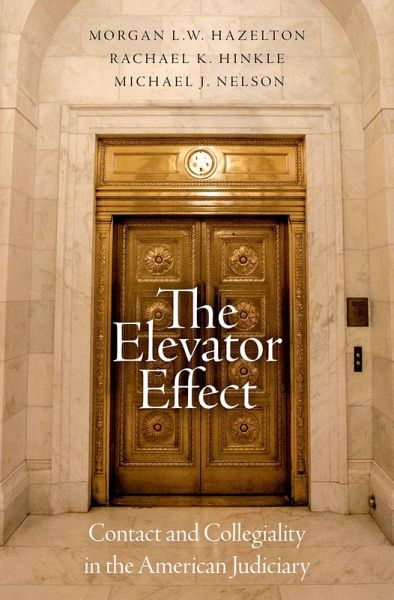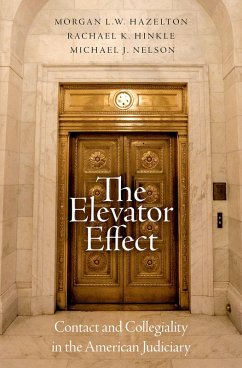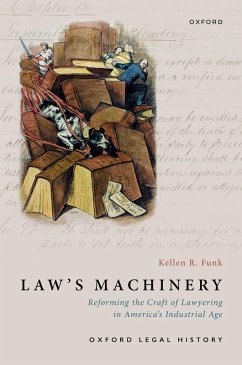
The Elevator Effect (eBook, PDF)
Contact and Collegiality in the American Judiciary
Versandkostenfrei!
Sofort per Download lieferbar
48,95 €
inkl. MwSt.
Weitere Ausgaben:

PAYBACK Punkte
24 °P sammeln!
Appellate judges wield enormous influence in the United States. Their decisions define the scope of legislative and executive power, adjudicate relationships between the federal government and the states, and determine the breadth of individuals' rights and liberties. But, compared to their colleagues on trial courts, they face a significant constraint on their power: their colleagues. The Elevator Effect: Contact and Collegiality in the American Judiciary presents a comprehensive, first of its kind examination of the importance of interpersonal relationships among judges for judicial decision...
Appellate judges wield enormous influence in the United States. Their decisions define the scope of legislative and executive power, adjudicate relationships between the federal government and the states, and determine the breadth of individuals' rights and liberties. But, compared to their colleagues on trial courts, they face a significant constraint on their power: their colleagues. The Elevator Effect: Contact and Collegiality in the American Judiciary presents a comprehensive, first of its kind examination of the importance of interpersonal relationships among judges for judicial decision-making and legal development. Regarding decision-making, the authors demonstrate that more frequent interpersonal contact among judges diminishes the role of ideology in judicial decision-making to the point where it is both substantively and statistically imperceptible. This finding stands in stark contrast to judicial decision-making accounts that present ideology as an unwavering determinant of judicial choice. With regard to legal development, the book shows that collegiality affects both the language that judges use to express their disagreement with one another and the precedents they choose to support their arguments. Thus, the overriding argument of The Elevator Effect is that collegiality affects nearly every aspect of judicial behavior. The authors draw on an impressive and unique original collection of data to untangle the relationship between judges' interpersonal relationships and the law they produce. The Elevator Effect presents a clear and highly readable narrative backed by analysis of judicial behavior throughout the U.S. federal judicial hierarchy to demonstrate that the institutional structure in which judges operate substantially tempers judicial behavior. Written in a broad and accessible style, this book will captivate students across a range of disciplines, such as law, political sciences, and empirical legal studies, and also policymakers and the public.
Dieser Download kann aus rechtlichen Gründen nur mit Rechnungsadresse in A, B, BG, CY, CZ, D, DK, EW, E, FIN, F, GR, HR, H, IRL, I, LT, L, LR, M, NL, PL, P, R, S, SLO, SK ausgeliefert werden.













